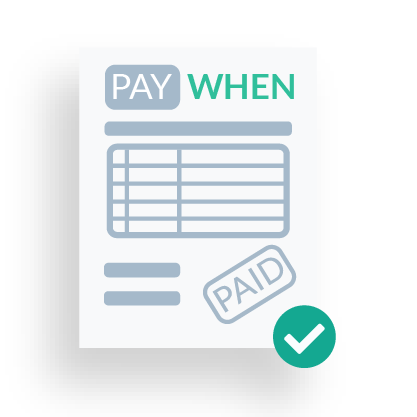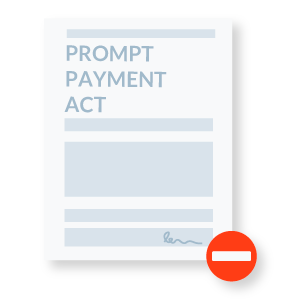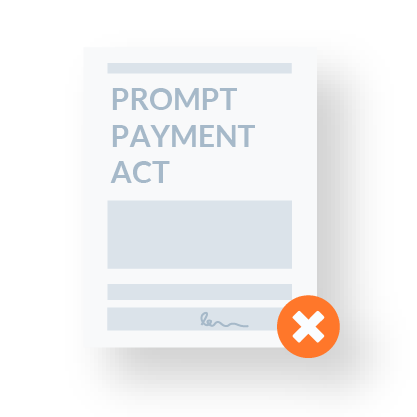Michigan Construction Contracts
- Private Jobs
- Public Jobs
- Top Links

Lien Rights Can't Be Waived by Contract
Michigan expressly prohibits the ability to waive lien rights by contract as against public policy.
Pay-If-Paid is Enforceable
Pay-if-paid clauses are enforceable to work under the contract in MI if the clause contains clear and unambiguous language setting a condition precedent to payment.

Pay-When-Paid is Enforceable
Pay-when-paid clauses are enforceable in MI as a timing mechanism setting a reasonable time for payment.

Prompt Payment Mostly Unregulated
Michigan doesn't regulate the timing of payments on private projects. The terms of the contract will apply.

Retainage Mostly Unregulated
Michigan doesn't regulate the amount of retainage allowed on private projects. The terms of the contract will apply.
Pay-If-Paid is Enforceable
Pay-if-paid clauses are enforceable to work under the contract in MI if the clause contains clear and unambiguous language setting a condition precedent to payment.

Pay-When-Paid is Enforceable
Pay-when-paid clauses are enforceable in MI as a timing mechanism setting a reasonable time for payment.

Payment Timing to Primes May Not Be Modified By Contract
Payment to prime contractors must be made within 30 days of approval of an invoice, or 15 days from receipt of funding from another state/federal agency; whichever is later. All other payments will be made according to the terms of the subcontract.

Maximum Retainage Cannot Be Modified
Retainage on public projects in Michigan cannot exceed the statutory limits of 10%, and no more retainage may be withheld after 50% completion if satisfactory progress is being made.
A construction contract outlines each party’s obligations, rights, and remedies on a project. But although the language in specific contract clauses is typically negotiable, Michigan has certain rules that govern what the agreement must include — and what is prohibited.
Keep in mind that, while Michigan’s rules for construction contract terms are written into state law, the courts determine how strictly those laws should be interpreted — and those interpretations can change.
On this page, you’ll find resources, legal information, and answers to frequently asked questions about Michigan’s construction contract and payment terms requirements.
Michigan construction contract provisions
While Michigan generally allows construction parties to set the terms of their agreement, there are some laws that regulate specific types of contract provisions. Any contract clause that contradicts the law is invalid and unenforceable.
“No lien” clauses
A “no-lien clause,” i.e. a provision that purports to waive a party’s lien rights by contract, is expressly prohibited in Michigan as against public policy.
Contingent payment clauses
There are two types of contingent payment clauses: pay-if-paid and pay-when-paid. Both of these types of clauses are enforceable, as the freedom to contract under Michigan law allows parties to ser the payment terms; which includes setting a condition precedent to payment. However, for a pay-if-paid clause to be enforceable it must clearly, and unambiguously express the intent of the parties to shift the risk of nonpayment to the subcontractor. If the clause is deemed ambiguous, the courts will treat it as a pay-when-paid clause that merely sets a reasonable time for payment.
Payment timing clauses
The Michigan prompt payment statutes only apply to public projects. So on private projects, the terms of the contract will govern when payment should be made, and any interest that may accrue due to late payment.
On public projects that provide for at least 4 progress payments, the prompt pay laws require payment to be made by the contracting entity within 30 days of approval of an invoice, or within 15 days of receipt of funding from another state or federal agency. All other payments will be governed by the terms of the contract between the parties.
Regarding late payment interest, this will also be set forth by the contract; as long as the interest charged is reasonable.
Retainage limits
Similar to the prompt payment laws, there are no statutes regulating retainage on private projects in Michigan. The amount withheld, and the timing of the release of retainage will be dictated by the terms of the contract.
On public projects, retainage is capped at 10% of each progress payment until the project reached 50% completion. Afterwards, if the project is deemed to be making satisfactory progress, no more retainage may be withheld. The amount withheld cannot exceed 10% based on the terms of the contract.
Michigan construction contract requirements
Only residential construction contracts are regulated in Michigan. Such contracts must be in writing, include the contractor’s license number (if a license is required), and cite the statute that requires the contractor to be licensed for their particular trade.
Other types of construction contract requirements
In addition to the requirements set forth above, if the home improvement contract is valued at over $300 and provides for installment payments, the contract must be in at least 8pt font, contain a Notice to Buyer informing them of their right to a copy of the contract and right to cancel/rescind, and must also include the total contract price, the downpayment amount, and a slew of other pieces of information; a full list of which can be found under MCL §445.1203.

